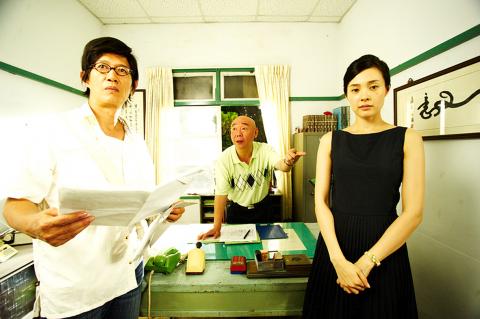Television cinematographer and director Lin Fu-ching (林福清) didn’t take the easy way out when it came to his debut feature Jumping Boy (不倒翁的奇幻旅程), a life-affirming children’s film that marries live action and animation. Though not the most exciting of movies, Jumping Boy deserves credit for combining real actors with animated elements while venturing into the territory of children’s cinema, a genre little visited by local filmmakers. Another merit is a lively cast led by eminent thespian Chin Shih-chieh (金士傑).
Chin plays Tian Bian, a celebrated children’s book author who rocketed to fame with his first published story, Roly-poly. But few people know that 20 years previously, the then-aspiring writer was repeatedly turned down by publishing houses and couldn’t sell any of the stories he wrote for his son, who was his most dedicated fan. One day, a friend of his son told Tian Bian a tale about a roly-poly doll. The writer took the story and passed it off as his own. Roly-poly became a best-selling book that brought Tian Bian fame and fortune, but the writer was never able to regain his son’s trust after the incident.
Back in the present day, Tian Bian decides to go back to his hometown in Tainan to find the boy he stole from and make amends. But instead of the boy, the aging writer meets Ka (Mai Hao-wei, 買皓瑋), an elementary school student who lost a leg to bone cancer. A friendship quickly develops between the two as they explore the pastoral town together and find strength in each other’s company along the way.

Photo courtesy of Activator Marketing Company
Director Lin reportedly invested three years and a personal bank loan worth NT$20 million in the work, which was inspired by a documentary he made in 2007 about a group of young children living with from bone cancer. Most of the movie takes place in the director’s hometown of Zuojhen (左鎮), Greater Tainan, where the mountainous, rugged landscape serves as a surreal backdrop for the film as it swings between reality and the fantasies told by Chin’s character.
Content-wise, the film is more about one man’s efforts to come to terms with his past than an imaginative portrait of the world as seen through the eyes of children. The story’s structure is a loose thread and risks losing the audience’s attention with its slow approach to storytelling. The already thin material is stretched even more in the middle of the movie.
The film’s five animated segments, totaling 25 minutes in length, are attention-grabbing. Beautifully realized by artist and professor Jack Shih (史明輝) and his team of student animators, each piece shows a distinctive style and can be appreciated as an individual work in its own right. Three of the five animated works have since entered the international film circuit and have been screened at showcases including the International Festival of Animated Films AniFest in the Czech Republic, Sapporo Short Film Festival in Japan and the International Short Film Festival Oberhausen in Germany.

Photo courtesy of Activator Marketing Company

Photo courtesy of Activator Marketing Company

In the March 9 edition of the Taipei Times a piece by Ninon Godefroy ran with the headine “The quiet, gentle rhythm of Taiwan.” It started with the line “Taiwan is a small, humble place. There is no Eiffel Tower, no pyramids — no singular attraction that draws the world’s attention.” I laughed out loud at that. This was out of no disrespect for the author or the piece, which made some interesting analogies and good points about how both Din Tai Fung’s and Taiwan Semiconductor Manufacturing Co’s (TSMC, 台積電) meticulous attention to detail and quality are not quite up to

April 21 to April 27 Hsieh Er’s (謝娥) political fortunes were rising fast after she got out of jail and joined the Chinese Nationalist Party (KMT) in December 1945. Not only did she hold key positions in various committees, she was elected the only woman on the Taipei City Council and headed to Nanjing in 1946 as the sole Taiwanese female representative to the National Constituent Assembly. With the support of first lady Soong May-ling (宋美齡), she started the Taipei Women’s Association and Taiwan Provincial Women’s Association, where she

Chinese Nationalist Party (KMT) Chairman Eric Chu (朱立倫) hatched a bold plan to charge forward and seize the initiative when he held a protest in front of the Taipei City Prosecutors’ Office. Though risky, because illegal, its success would help tackle at least six problems facing both himself and the KMT. What he did not see coming was Taipei Mayor Chiang Wan-an (將萬安) tripping him up out of the gate. In spite of Chu being the most consequential and successful KMT chairman since the early 2010s — arguably saving the party from financial ruin and restoring its electoral viability —

It is one of the more remarkable facts of Taiwan history that it was never occupied or claimed by any of the numerous kingdoms of southern China — Han or otherwise — that lay just across the water from it. None of their brilliant ministers ever discovered that Taiwan was a “core interest” of the state whose annexation was “inevitable.” As Paul Kua notes in an excellent monograph laying out how the Portuguese gave Taiwan the name “Formosa,” the first Europeans to express an interest in occupying Taiwan were the Spanish. Tonio Andrade in his seminal work, How Taiwan Became Chinese,